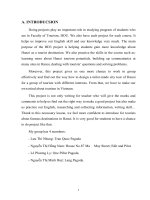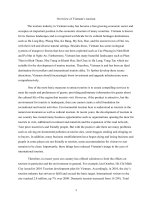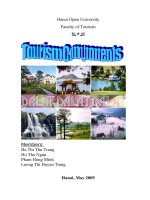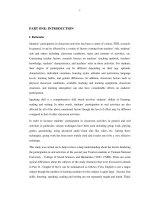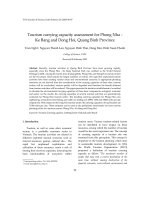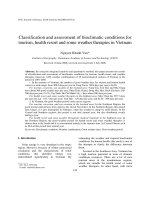Benchmarking tourism
Bạn đang xem bản rút gọn của tài liệu. Xem và tải ngay bản đầy đủ của tài liệu tại đây (144.5 KB, 5 trang )
Source: CBI Market Information Database • URL: www.cbi.nl • Contact: • www.cbi.nl/disclaimer
European buyers’ requirements:
Benchmarking the tourism industry
Introduction
Environmental, health and safety, and social issues have become increasingly important in
international trade. There are regional and national laws that apply, and in addition there are a
number of international standards and codes that either have to be adopted or may be
adopted on a voluntary basis. Many companies have developed a Corporate Social
Responsibility policy, where social issues are highlighted.
Tourism is the world’s largest economic sector. The sector provides employment to many
people and is an important contributor to the Gross Domestic Product in a large number of
countries, in particular in developing countries.
Sustainability of the tourist sector is in the interest of many stakeholders, not only the local
entrepreneurs in the destination countries, but also tour operators, their customers, nature
conservationists, human rights activists, local governments etc. Logically, a green and friendly
place is likely to become a more popular tourist destination then a polluted and unpleasant
one.
This document describes buyers’ requirements in the tourist sector with regard to
environmental and social issues. The method of “benchmarking”, as used in other documents
on buyers’ requirements, has not been used in this document. The reason for this is that it is
difficult to compare tour operator’s policies since there is no standard ‘tourist product’. Each
holiday programme is different per destination and involves different sustainability issues. For
example, a tour operator organising diving holidays to Egypt faces different issues from a tour
operator organising horse riding holidays in Mongolia. Table 1 lists all the different suppliers
that may be hired by tour operators.
Table 1: Tour Operators’ Main Contracted Products and Suppliers
Elements of Tourism Products Suppliers
Accommodation Hotels, bed & breakfasts, self-catering, (serviced) apartments,
campsites, cruise ships
Transport to and from
destinations
Public transport (e.g. trains), airports, scheduled air carriers, air
charters, scheduled sea passages, chartered sea passages,
coaches, cruises
Catering and food and
beverage
Restaurants and bars, grocery stores, farmers, fishermen, local
commerce/markets, bakers, butchers, food wholesalers
Ground transport Car rentals, boat rentals, fuel providers, gas stations, coach
rentals
Ground services Agents, handlers or inbound operators in the destination
Cultural and social
events
Excursion and tour providers, sports and recreation facilities,
shops and factories
Environmental, cultural
and heritage resources
of destinations
Public authorities, protected site managers, private
concessionaires and owners
Source: “Supply chain management for tour operators”, Tour Operators Initiative
Policies by tour operators
European tour operators are increasingly paying attention to the sustainability of the tourist
sector. Some tour operators have developed a whole set of buyers’ requirements, others are
(so far) only focussing on a limited set of issues (e.g. child labour, sexual exploitation of
women and children, purchase of goods made of endangered species or plants).
Page 1 of 5
Source: CBI Market Information Database • URL: www.cbi.nl • Contact: • www.cbi.nl/disclaimer
An important reason for tour operators to implement a sustainability policy is commercial
interest. The development of ‘the sustainable package tour’ is likely to become a new market
in the tourist sector. A sustainability policy may enable the company to market its products
more effectively and to improve its public image among consumers, business partners and
with the host communities
The next paragraphs present an overview of sustainability issues that tour operators (may)
pay attention to in their purchase policy in the destination country. They are based on the
policies of large tour operators. The issues have been categorized in ‘environmental
requirements’, ‘social requirements’ and ‘local profit requirements’. Each section is subdivided
in the three dimensions of a holiday: transport, accommodations and activities.
Environmental issues
Transport:
Transport companies operating in the tourist sector may pay attention to the following issues:
• Use of en environmental label, e.g. the Green Globe 21 programme has a label for tourist
transport companies (see external links)
• Use of modern transport vehicles (touring cars, minivans, boats) with fuel-efficient engines,
exhausts that limit polluting emissions etc. The vehicles should be periodically checked and
well maintained
• Efficient use of transport vehicles (use of vehicles only when necessary, occupancy rate
etc.) and/or use of alternative transport modes (alternating bus/ train/ ship transport)
• Connection to public transport or include walking/ cycling certain tracks of the journey.
Accommodations
Tour operators often use checklists when purchasing accommodations that may include criteria
to assess the environmental management of the accommodation. Accommodations with a
good environmental performance may be preferred to comparable accommodations with a bad
performance. The checklist is likely to cover issues relating to energy, water, waste and waste-
water, purchasing policy, activities in the area of the conservation of nature or cultural
traditions and local community development.
Energy management
• Use of green electricity and green energy
• Installation of automatic switch-off systems for heating, air conditioning, lighting
• Energy efficient light bulbs
• Adequate insulation
• Instructions to guests for energy saving
Water management
• Installation of water-saving showers, toilets and taps
• Instant reparation of leakages
• Efficient use of water for gardening
• Instructions to guests for water saving
Waste management
• Separation of waste and environmentally responsible disposal
• Measures for waste reduction (e.g. avoidance of mono packaging for food, toiletries)
• Pre-treatment of waste water before discharge
Other points of attention
• No/limited use of chemicals (cleaning, pools etc.), toxicity of materials and products used
• Contribution to biodiversity and nature conservation
• Staff education on environmental management
• Information to guests on the accommodation’s environmental policy
• Support of local environmental projects and initiatives
• Information to guests on sustainable holiday activities
Page 2 of 5
Source: CBI Market Information Database • URL: www.cbi.nl • Contact: • www.cbi.nl/disclaimer
TUI Nordic: Promoting Codes of Conduct for Responsible Tourism Among Suppliers
TUI Nordic, part of World of TUI (TUI AG), has established a close relationship with the ‘Blue
Village’ hotels, in order to integrate sustainability practices into the Blue Village quality
requirements. The inclusion of environmental and social elements in the Blue Village concept
has had a positive effect on the image of the hotels. Surveys have shown that Blue Village
customers value active commitment from the hotels and believe that information is important.
By implementing environmental management systems, the hotels have also been able to
reduce their operational costs, for example by lowering their water and energy consumption.
The Blue Village total quality concept has also generated benefits to TUI Nordic, including
early reservations, enhanced reputation, increased client satisfaction and customer loyalty.
Source: Tour Operators Initiative
Activities
Environmental issues related to tourist activities are dependent on the type of activity. Many
issues listed at the Accommodations’ section will also be relevant to providers of tourist
activities. In addition, a tour operator may look into the following issues:
• Implementation of (international) environmental guidelines, which relate specifically to the
activity organised by the provider. For example, international guidelines have been
developed for wildlife watching at sea (dolphin and whale watching), diving activities, boat
excursions in nature parks etc. There are several sources to find out whether there are
guidelines specific to the activity organised by your agency, e.g. the website of the Great
Barrier Reef Marine Park Authority for marine activities (see external links).
• No sale of products made of endangered plant or animal species listed on CITES list (see
the related document, as well as a link in the external links section)
• Promotion of environmentally friendly behaviour among customers. E.g., the provider can
provide oral or written information (‘do’s and don’ts’) on responsible behaviour to
customers
• Promotion of activities: the tour operator may want to promote activities which are
environmentally friendly, e.g. walking tours, cycling tours
• Exclusion of activities. The tour operator may decide to exclude certain activities which are
environmentally damaging (e.g. walking or fishing in environmentally sensitive areas), and
will not purchase contracts with agencies offering these activities.
Premier Tours: Camps and Lodges that Support Local Conservation Projects
Premier Tours is a US tour operator specialising in safari tours to Southern and East Africa, selects
accommodation facilities (tented camps and lodges) in national parks and private game reserves
that are committed to sustainable practices and apply a sensible approach to tourism,
conservation and local community involvement. This ensures a sustainable environment,
employment and other benefits for local communities, and a high-quality holiday for clients.
Premier Tours favours camps that:
• Employ full-time ecologists whose job it is to ensure that camps are as environmentally friendly
as possible
• Provide electricity through solar-powered panels or generators
• Do not allow hunting, but support photographic safaris
• Provide for a direct or indirect spin-off to local communities and/or conservation projects
• Have lined tanks for safe sewage processing
• Have garbage removed to appropriate places for safe disposal.
Camps, lodges and reserves are selected on the basis of a number of criteria. Brick-and- mortar
establishments in environmentally sensitive areas are avoided, as are over-crowded camps, so
that guests can be given personalized attention and impacts on the environment and on game
viewing can be minimized.
Source: Tour Operators Initiative
Page 3 of 5
Source: CBI Market Information Database • URL: www.cbi.nl • Contact: • www.cbi.nl/disclaimer
Social issues
Social issues are similar for all tourism service suppliers. Tour operators will look particularly
into the following issues:
Human rights and labour conditions
The tourist industry is a sector where labour conditions can sometimes be critical. Some of the
issues are, to mention a few, long working hours, lack of job security or income and seasonal
labour, badly paid jobs and lack of health insurance, severe physical circumstances, limited
career prospects. Managers in the tourist sector may contribute to improvement of labour
conditions by taking the following measures:
• No violation of human rights. A specific point of attention in the tourist sector in this
respect is the sexual exploitation of children and women. Tourism service suppliers can
declare their commitment against such practices, e.g. by adopting the ECPAT Code the
commercial exploitation of children (see external links).
• Equal opportunities and non-discrimination
• Labour relations (including fair treatment, fair wages, security of employment, working
hours and employees’ rights), for example demonstrated by commitment to the ILO
Conventions on basic human and labour rights (see external links)
• Training and education: enable staff to take part in management training or other types of
training to enhance career opportunities
• Establish policies and guidelines to protect health and safety of employees, providing
adequate gear and tools. This is particularly relevant for companies that organise activities
such as diving, or other sports and/or outdoor activities
• No use of child labour
Health risks
Tour operators need to be sure that their customers are not exposed to health risks. Pertinent
health risks in tourist places are: unsafe water, infection with legionella, food poisoning and
risk of fire (and other emergency situations). Tour operators may check the following:
• Installation of water purifiers and/or warning signs if tap water is not potable
• Implementation of precautionary measures to combat customer infection with the
legionella bacteria
• Implementation of precautionary measures to guarantee hygiene and prevention of food
poisoning
• Implementation of measures in case of an emergency, e.g. installation of sufficient fire
extinguishers, emergency training to staff, first aid training to staff, telephone numbers of
police, ambulance and fire brigade in the rooms and at the reception.
Atlas Voyages: Suppliers’ Hygiene Control Campaign
Atlas Voyages, a Morocco-based tour operator, developed a suppliers’ hygiene control
campaign. The company identified 17 hotels and restaurants as its main suppliers, which were
the focus of the quality control campaign for hygiene and food quality. Subsequently, the tour
operator asked an independent organisation that is specialised in HACCP (Hazard Analysis and
Critical Control Point) food safety system, to conduct visits to the main suppliers. These visits
raised suppliers’ awareness of hygiene issues and their interest in improving their
performance. In addition, some of the visited suppliers started the process of applying for
HACCP certification.
Source: Tour Operators Initiative
Community-based tourism
The local culture is part of the attraction of a destination and tour operators often aim to
increase the sensitivity of customers towards the local culture. They provide information on
local values and traditions and practical suggestions for ‘do’s and don’ts’. In addition, the local
community should gain profits from tourist activities and not be negatively affected due to loss
of land rights or inflation of prices. The following issues may be checked by tour operators:
Page 4 of 5
Source: CBI Market Information Database • URL: www.cbi.nl • Contact: • www.cbi.nl/disclaimer
• Respect of land and indigenous rights
• Consultation and participatory decision-making with the local population and affected
stakeholders
• Respect for rights of indigenous, ethnic and minority groups, and of local communities
• Compliance with local and national legislation
• Purchasing of locally produced goods, e.g. (organic) food products, furniture, textiles
• Employment of local people and use of local services, economic linkages with local
communities
• Contracting with small and micro-enterprises, including those operated by indigenous,
ethnic or minority groups
Information on buyers’ requirements
• The Tour Operators Initiative (TOI) has published “A Practical Guide to Good Practice.
Guide for managing environmental and social issues in the accommodations sector”. The
guide gives insight in (possible) buyers’ environmental and social requirements for tourists
accommodations. It provides practical information on how to address these requirements,
including references to other sources of information. The guide is available at the TOI
website (see External links).
• TOI and several other partners has also developed “A Practical Guide to Good Practice:
Managing Environmental Impacts in the Marine Recreation Sector”. This guide is an
assessment checklist to identify responsible marine recreation providers. The assessment
checklist addresses major environmental and social issues and recommended good
practices for marine recreation providers. The checklist is intended for use by hoteliers,
tour operators, and cruise lines during the selection and contracting processes of marine
recreation providers. Marine recreation providers are e.g. operators of snorkelling, diving,
glass bottom boat trips, boat rentals, sport fishing.
• Case studies on best practices by tour operators at the TOI website (see External links).
Conclusion
Increasing attention is paid to sustainability issues in the tourist sector, covering
environmental, socio-economic, cultural and health-related issues. Tourism is a very diverse
sector, which makes it difficult and perhaps undesirable to develop one set of sustainability
criteria.
Tour operators may use checklists for the selection of new tourism service suppliers, but they
may also support their current suppliers in improving their economic, environmental and social
performance. Tour operators often have access to technology and information that smaller
suppliers may have difficulty obtaining themselves. And because tour operators deal with a
wide range of different suppliers, they can more easily gather information on a variety of best
practices and facilitate the sharing of experiences amongst suppliers.
There are a number of ways that tour operators can help enable their suppliers to improve
their sustainability performance and meet set sustainability criteria and targets. Possible
support measures include:
• Raising awareness on sustainability issues among suppliers and demonstrating why
sustainability performance is important
• Providing technical support to suppliers on how to improve their sustainability performance,
particularly in areas that have been identified as priorities
• Offering incentives to sustainable suppliers by recognising and rewarding improvements on
key environmental, social and economic issues.
Page 5 of 5
